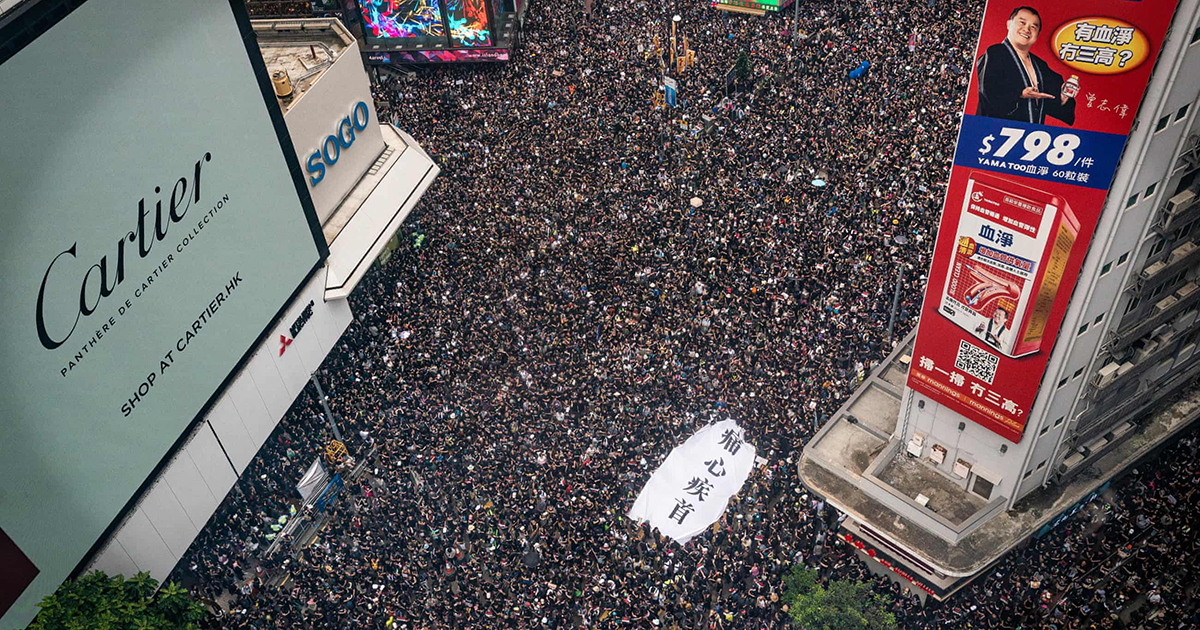Some two million people took to the streets of Hong Kong to protest on Sunday, June 16, organisers said.
If confirmed, it would be the largest protest in Hong Kong's history.
It was previously reported that there were 1.44 million protesters.
The Civil Human Rights Front, which is organising the rallies, said Hong Kongers would protest and strike on Monday "until their voices are heard".
Jimmy Sham, from the Civil Human Rights Front protest group, told reporters late on Sunday evening: "Today's march we had almost two million people."
The previous Sunday, June 9 protest saw about one million protesters.
Hong Kong has a population of 7.48 million. Two million protesters on the streets would mean more than one in four Hongkongers took part.
Police say otherwise
However, police said turnout was 338,000 at its peak
Regardless, opposition to the extradition bill has united an unusually wide cross-section of Hong Kong, from influential legal and business bodies to religious leaders.
Police held back
Police officers reportedly held back to allow the throngs of people to take over the streets and slowly pass through the city.
The protest was mainly peaceful.
As darkness fell, protesters surrounded the legislative council building.
They carried placards that read "The students did not riot".
This was in response to police labelling last Wednesday's student protests a riot, an offence punishable by up to 10 years in jail.
Rare time government bowed to people power
In a statement released on Sunday night, the government struck a conciliatory tone.
It said it understood the protesters' views "have been made out of love and care for Hong Kong".
It promised that Chief Executive Carrie Lam would adopt a more "sincere and humble attitude" towards public criticism.
Protesters are still insisting they won't settle for anything less than the bill being completely withdrawn.
Lam's resignation won't solve matters
But Lam's resignation might not mean much as there is no guarantee her replacement can be all that different.
Under Hong Kong's political system, the leader is elected by a small panel filled with allies of the Beijing government.
China's foreign ministry publicly backed Lam on Saturday, even as speculation about Lam's future amid the continued protests persists.
Lam is an unelected leader.
Two months of protests by Hongkongers in 2014 calling for the right to directly elect Hong Kong's leader won no concessions from Beijing.
Protecting Hong Kong's way of life
Hong Kong is now part of China under a "one country, two systems" principle.
But an increasingly assertive China is stamping on the city's unique freedoms and culture enjoyed since the handover from Britain in 1997.
China calls Hong Kong a special administrative region that enjoys a great deal of autonomy that has made it a key business and media hub in the region.
Hong Kong keeps its own judicial independence, its own legislature and economic system.
But it remains subject to pressure from mainland China, as Beijing is responsible for defence and foreign affairs.
Bigger than previous protests
Hong Kong's biggest protest to date was a massive rally in support of Tiananmen protesters in May 1989, before Beijing's deadly crackdown.
The 1989 demonstrations brought out roughly 1.5 million people, sources said at the time.
Also:
Top photo by Anthony Kwan/ Getty Images
If you like what you read, follow us on Facebook, Instagram, Twitter and Telegram to get the latest updates.
